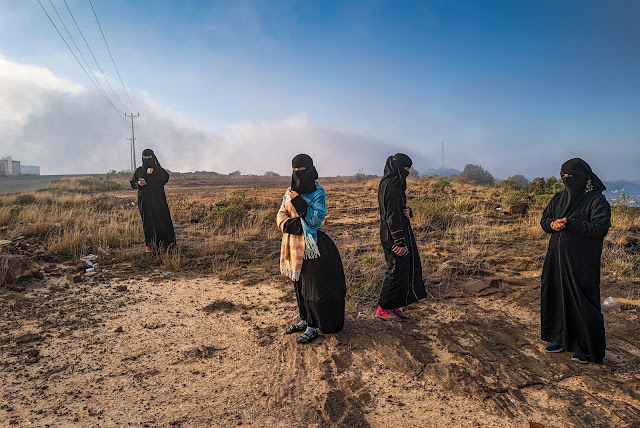Even MBS’s critics concede that he has roused the country from an economic and social slumber. In 2016, he unveiled a plan, known as Vision 2030, to convert Saudi Arabia from—allow me to be blunt—one of the world’s weirdest countries into a place that could plausibly be called normal. It is now open to visitors and investment, and lets its citizens partake in ordinary acts of recreation and even certain vices. The crown prince has legalized cinemas and concerts, and invited notably raw hip-hop artists to perform. He has allowed women to drive and to dress as freely as they can in dens of sin like Dubai and Bahrain. He has curtailed the role of reactionary clergy and all but abolished the religious police. He has explored relations with Israel.
He has also created a climate of fear unprecedented in Saudi history. Saudi Arabia has never been a free country. But even the most oppressive of MBS’s predecessors, his uncle King Faisal, never presided over an atmosphere like that of the present day, when it is widely believed that you place yourself in danger if you criticize the ruler or pay even a mild compliment to his enemies. MBS’s critics—not regicidal zealots or al‑Qaeda sympathizers, just ordinary people with independent thoughts about his reforms—have gone into exile. Some fear that if he keeps getting his way, the modernized Saudi Arabia will oppress in ways the old Saudi Arabia never imagined. Khalid al-Jabri, the exiled son of one of MBS’s most prominent critics, warned me that worse was yet to come: When he’s King Mohammed, Crown Prince MBS is going to be remembered as an angel
.
Graeme WoodFascinating and comprehensive profile of Saudi Arabia’s future king who could shape politics in the Middle East – and beyond – for the coming decades, maybe even half a century. He strikes me as a dangerous mix of Vladimir Putin (MBS’ seven-years-long invasion of Yemen has caused numerous deaths and destruction – supported with weapons deliveries by the United States – and only now there are tentative signs of a cessation of hostilities), Xi Jinping (promoting economic prosperity for the masses while relentlessly cracking down on dissent and criticism) and Louis XIV (L’état, c’est moi!
). As for his forced modernization of the country, we will have to wait and see if this becomes a permanent cultural shift, or if it will cause a violent backlash and sudden return towards conservative Islam – as it happened in Iran in 1979.

On one side are liberals, tugging on the sympathies of Westerners; on the other, Islamists who are also opposed to the monarchy. Letting this latter group out would not just mean the end of rock concerts and coed dining. They would not stop until they brought down the House of Saud, seized the country’s estimated 268 billion barrels of oil and the holy cities of Mecca and Medina, and established a terrorist state. In private conversations with others, MBS has likened Saudi Arabia before the Saud family’s conquest in the 18th century to the anarchic wasteland of the Mad Max films. His family unified the peninsula and slowly developed a system of law and order. Without them, it would be Mad Max all over again—or Afghanistan.
Still, the crown prince’s argument—that if he extended forgiveness to good people who deserved it, he would have to extend it equally to bad people who did not—struck me as bizarre. Why would one require the other? Then I realized that MBS was not saying that the failure of his plan to remake the kingdom might lead to catastrophe. He was saying that he’d guarantee it would. Many secular Arab leaders before him have made the same dark implication: Support everything I do, or I will let slip the dogs of jihad. This was not an argument. It was a threat.
Yet after spending hours in MBS’s company, and in the company of his allies and enemies, I was convinced that neutering the clergy was not just symbolic. He was fighting them avidly, and personally. The kings have historically stayed away from religion
, Bernard Haykel, a scholar of Islamic law at Princeton and an acquaintance of MBS’s, told me. Outsourcing theology and religious law to the big beards was both an expedient and a necessity, because no ruler had any training in religious law, or indeed a beard of any significant size.
By contrast, MBS has a law degree from King Saud University and flaunts his knowledge and dominance over the clerics. He’s probably the only leader in the Arab world who knows anything about Islamic epistemology and jurisprudence
, Haykel told me.
In Islamic law, the head of the Islamic establishment is wali al-amr, the ruler
, MBS explained. He was right: As the ruler, he is in charge of implementing Islam. Typically, Saudi rulers have sought opinions from clerics, occasionally leaning on them to justify a policy the king has selected in advance. MBS does not subcontract his religion out at all.
Another important aspect that the article briefly touches upon is the relationship with the United States and specifically the current Biden administration. Apparently, President Joe Biden has so far refused to speak with MBS as a fellow head of state in part because of the murder of Jamal Khashoggi. Nevertheless, after the start of the war in Ukraine the US and other Western countries approached Saudi Arabia to secure increased deliveries of oil and natural gas. I think this highlights the downside of using moral judgements as the basis of foreign policy: you never know when you’ll need that leader or country you were shunning previously. President Biden’s penchant for labeling other leaders murderers and war criminals or refusing to address them may be honest, but it’s bad policy and won’t win him (or the United States) any diplomatic points in the long run.
Post a Comment